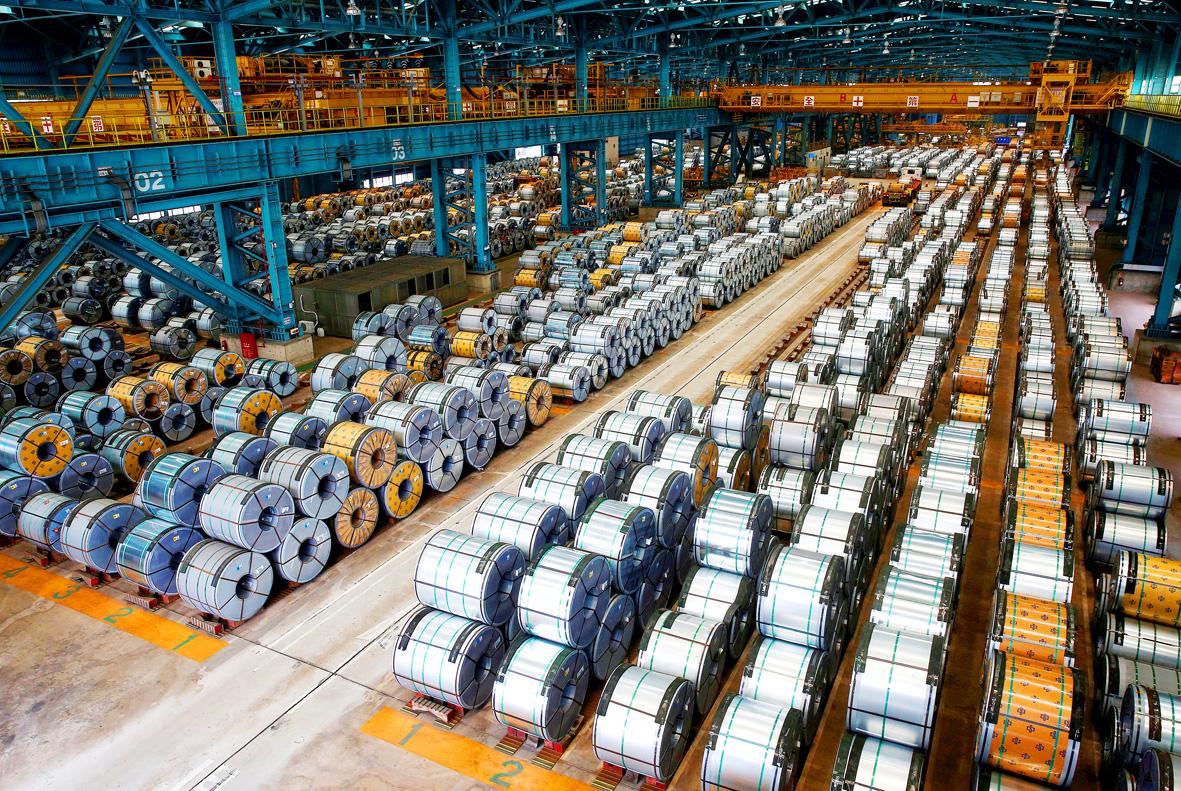China Steel Corp (CSC, 中鋼) is raising steel prices for September delivery by an average of 1.49 percent month-on-month as COVID-19 economic stimulus packages and reopening markets boost demand worldwide.
The price hikes from the nation’s biggest steelmaker came on the heels of a US$20 per tonne increase from its Japanese peers for steel exports and a US$25 per tonne increase from South Korean makers for the local market, CSC said in a statement on Friday last week.
In China, the recovering automotive market and new infrastructure construction projects have raised steel prices to high levels, CSC said.

Photo: Tyrone Siu / Reuters
To accelerate economic recovery, Beijing plans to invest 1.2 trillion yuan (US$171.62 billion) on public infrastructure projects, which would spur demand for steel, the company said.
Flood reconstruction efforts in China have also stimulated steel demand, it said.
“It is clear that the global economy is moving in a positive direction, as the purchasing managers’ indices in Europe, the US, Japan, South Korea, Southeast Asia and Taiwan have all trended up after they started reopening businesses in June,” CSC said.
“Demand for steel is growing,” the company added.
CSC said that global iron ore prices have been hovering at high levels, pushing up manufacturing costs for steelmakers.
The uptrend in iron ore prices is an indicator that the world’s steel industry is recovering, it added.
The Kaohsiung-based steelmaker said it only raised prices mildly, with an aim to divert the risk of order decreases as customers tend to buy more steel overseas when the New Taiwan dollar appreciates against the US dollar, which cuts importers’ purchasing costs.
Over the past month, the NT dollar has risen 0.59 percent to NT$29.593 against the US dollar as of Friday last week, from NT$29.77 on June 15, central bank data showed.
Based on the latest adjustments, prices of hot-rolled steel and cold-rolled steel are to increase NT$300 per tonne, marking the third straight month of price hikes, CSC said.
Hot-rolled and cold-rolled steel are used in auto manufacturing and building construction.
The NT$300 price increase also applies to hot-rolled steel slabs and hot-dipped, zinc-galvanized sheets, which are used in the production of consumer electronics and other high-tech devices such as PCs, the company said.
The price for electro-galvanized sheets is to rise by NT$500 per tonne, the biggest hike among CSC’s steel products.
Over the past seven months, the company has struggled to eke out profits due to slumping prices and shrinking demand.
It posted pretax losses of NT$534.99 million (US$18.08 million) for May, greater than April’s pretax losses of NT$493.16 million.
CSC last month told shareholders that it aimed to return to the black by the end of this year.

CHIP RACE: Three years of overbroad export controls drove foreign competitors to pursue their own AI chips, and ‘cost US taxpayers billions of dollars,’ Nvidia said China has figured out the US strategy for allowing it to buy Nvidia Corp’s H200s and is rejecting the artificial intelligence (AI) chip in favor of domestically developed semiconductors, White House AI adviser David Sacks said, citing news reports. US President Donald Trump on Monday said that he would allow shipments of Nvidia’s H200 chips to China, part of an administration effort backed by Sacks to challenge Chinese tech champions such as Huawei Technologies Co (華為) by bringing US competition to their home market. On Friday, Sacks signaled that he was uncertain about whether that approach would work. “They’re rejecting our chips,” Sacks

Taiwan’s exports soared 56 percent year-on-year to an all-time high of US$64.05 billion last month, propelled by surging global demand for artificial intelligence (AI), high-performance computing and cloud service infrastructure, the Ministry of Finance said yesterday. Department of Statistics Director-General Beatrice Tsai (蔡美娜) called the figure an unexpected upside surprise, citing a wave of technology orders from overseas customers alongside the usual year-end shopping season for technology products. Growth is likely to remain strong this month, she said, projecting a 40 percent to 45 percent expansion on an annual basis. The outperformance could prompt the Directorate-General of Budget, Accounting and

NATIONAL SECURITY: Intel’s testing of ACM tools despite US government control ‘highlights egregious gaps in US technology protection policies,’ a former official said Chipmaker Intel Corp has tested chipmaking tools this year from a toolmaker with deep roots in China and two overseas units that were targeted by US sanctions, according to two sources with direct knowledge of the matter. Intel, which fended off calls for its CEO’s resignation from US President Donald Trump in August over his alleged ties to China, got the tools from ACM Research Inc, a Fremont, California-based producer of chipmaking equipment. Two of ACM’s units, based in Shanghai and South Korea, were among a number of firms barred last year from receiving US technology over claims they have

BARRIERS: Gudeng’s chairman said it was unlikely that the US could replicate Taiwan’s science parks in Arizona, given its strict immigration policies and cultural differences Gudeng Precision Industrial Co (家登), which supplies wafer pods to the world’s major semiconductor firms, yesterday said it is in no rush to set up production in the US due to high costs. The company supplies its customers through a warehouse in Arizona jointly operated by TSS Holdings Ltd (德鑫控股), a joint holding of Gudeng and 17 Taiwanese firms in the semiconductor supply chain, including specialty plastic compounds producer Nytex Composites Co (耐特) and automated material handling system supplier Symtek Automation Asia Co (迅得). While the company has long been exploring the feasibility of setting up production in the US to address